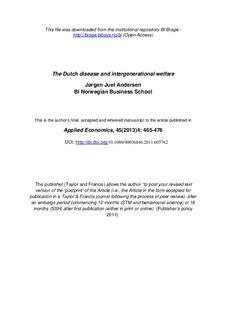The Dutch disease and intergenerational welfare
Journal article, Peer reviewed
Permanent lenke
http://hdl.handle.net/11250/93472Utgivelsesdato
2013Metadata
Vis full innførselSamlinger
- Scientific articles [2181]
Originalversjon
10.1080/00036846.2011.605762Sammendrag
Governments in resource abundant economies face a tradeo¤ between transferring wealth to present generations and saving for future generations. Employing an overlapping generations framework with endogenous growth, this paper analyzes the intergenerational welfare e¤ects of: (1) a wealth transfer policy where the entire wealth is transferred to the generations alive at present; (2) an income transfer policy where the wealth is saved and the permanent income of the wealth is transferred to all present and future generations, forever. Not surprisingly, present generations are unambiguously better o¤ with the wealth transfer policy. Less trivially, however, the wealth transfer policy can be associated with higher wel-fare also for future generations. The intuition for this result is that while a wealth transfer depresses growth only in the periods subsequent to the transfer, income transfers constitute a permanent drag on growth. Perhaps counter to the naïve intuition, the policy of saving the wealth and distributing the permanent income to all present and future generations is less bene cial for the future generations if the real return to saving is high
Beskrivelse
This is the author’s final, accepted and refereed manuscript to the article
